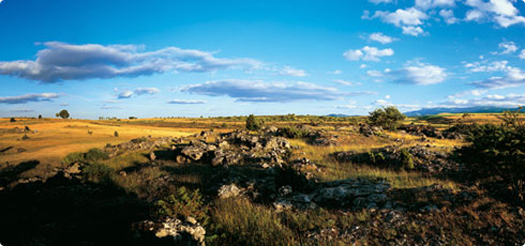
First, he will take millions of gallons of our clean mountain water, to this he will add a cocktail of up to up to 600 toxic chemicals including highly corrosive salts, carcinogens like benzene, and radioactive elements like radium.
He will then pump the noxious mixture deep into our ground.
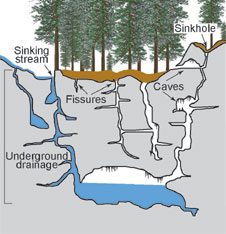
When this hydrofracking process as it's called, has done its work, and natural gas has been extracted, Martin's people will dump some of this poisoned water into open pits on the site — similar, one imagines, to the one shown below: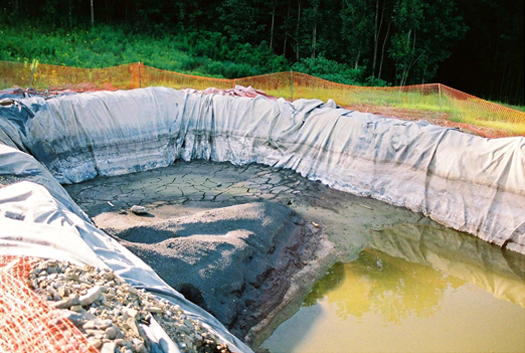
The rest will be left underground where some of it is highly likely to poison our ground water.
He hopes to repeat this Halliburton-designed process dozens of times, all over our region.
Dr Schuepbach's plan is not illegal. Although hydro-fracking at one well uses as much water in three days as a Cevenol village with 1,000 inhabitants consumes in four years, he has a permit. The Permit of Nant as it's called, was granted last year to Schuepbach Energy LLC by the French government. The area granted is shown on the map below.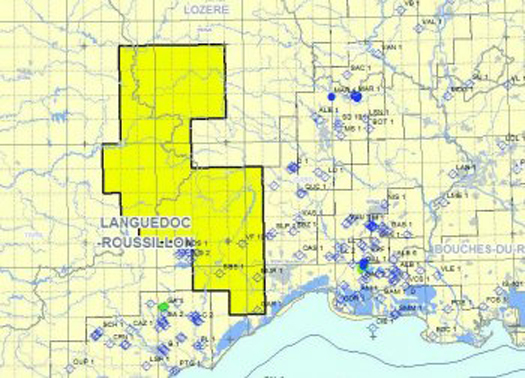
This decision was not, to put it mildly, widely publicized — but word has got out and we are all now cross.
We're also pretty amazed to discover who is behind this plan. Dr Schuepbach is its front man, but a good deal of the money to pay for it comes from a venture fund, CIC Partners, whose Managing Partner is a confidant of George and Laura Bush. (Marshall Payne is the guy in the blazer on the right in the photo below. He is co-chair of the Barbara Bush Foundation for Family Literacy. Laura Bush is in the middle.)
Now I like Texas a lot, so it's distressing to me personally that Texans could be behind this ecocidal plan. I'm sure a misunderstanding occurred when Martin and Marshall were discussing the Nant project at the Dallas Country Club (I'm guessing the location). The Cevennes must have looked, on a map, like a largely empty area containing only rocks, trees, and a few poor people in small communities who would cause little trouble.
The mischevious French government, when granting the Texans their permit, may well have emphasized this tranquil image.
What the Texan contingent may not have realized is that the Cévennes has been famous for its resistance to centralized tyranny since the early seventeenth century and before.
The Camisards, for example, were effective rebels against both Crown and Catholic Church. They pretty much invented guerilla warfare whilst opposing the armies of Louis XIV, the absolutist “Sun King”, over many years. In the long run they lost...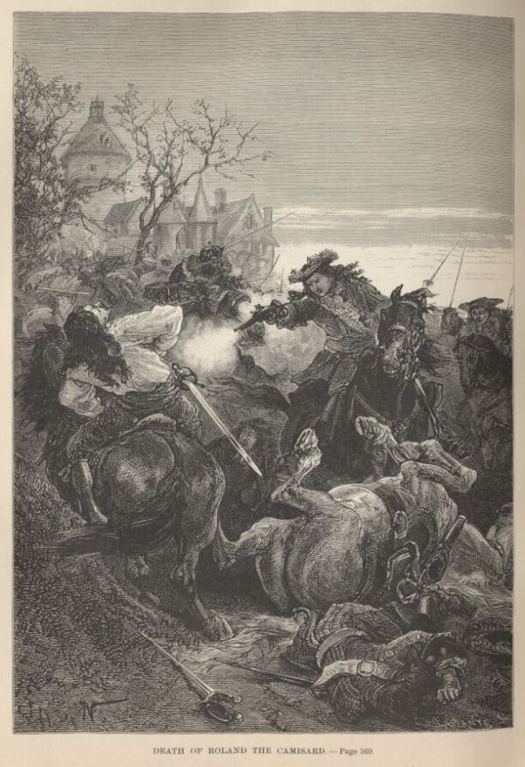
...but, ever since, there's been a tacit agreement between the French state and the Cevennes to leave each other alone.
Foreign invaders have not been so wise. During the Nazi occupation of France, for example, the Cévenols (as inhabitants here are called) hid and protected large numbers of Jewish children and German deserters. Fugitives especially at risk were guided over old sheep tracks high in the mountains and hidden in wood-cutters huts or sheep stalls. Many of these are still used. The Cévennes landscape and culture proved to be ideal for armed partisan operations against the occupiers and their collaborators.
Mistrust of all things from Paris and beyond has not diminished in recent times. Au contraire. In 1999 a famous son of the region, José Bové, leader of the farm-workers' union, trashed a McDonald's restaurant with a mechanical digger. He was given a three-month jail sentence, but 40,000 supporters turned out in his support at his trial.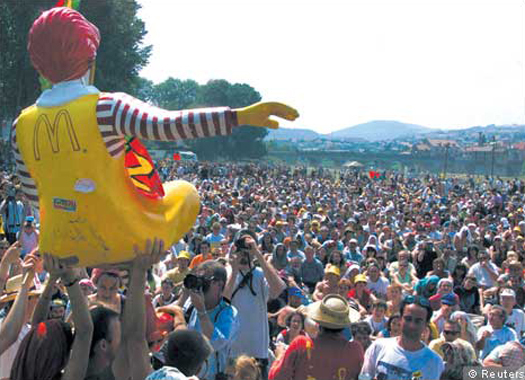
Today, a decade on, Bové has been elected to the European Parliament as a member of Europe Écologie, a coalition of French environmentalist political parties. He is vehemently opposed to Gaz de Schiste.
So what happens next? In March, eighty French parliamentarians signed a motion against the exploitation of shale gas. Shortly afterwards, the government extended a moratorium on shale gas exploration until June when two official reports are due to be published on the environmental impacts of “unconventional resource development”.
Although natural gas has acquired a reputation for cleanliness, this is largely based on its lower carbon dioxide emissions when burned. It emits roughly half the amount of carbon dioxide as coal and about 30 percent less than oil. Less publicised, and much uglier, are the emissions over its production life cycle from the moment a well is plumbed to the point at which the gas is used.
The dangers posed to our water supplies by the hydrofracking process and the effects to both health and the environment, are much more severe that was previously assumed. The toxic chemicals used in fracking can leach into the water supplies that, as the Oscar nominated film Gasland showed, it has been possible actually to light water as it comes out of the tap.
The Texans' plans for the Cevennes are being shaped by a bigger energy politics picture. A global rush is on to tap the Earth’s deep gas-bearing shales miles beneath the surface. The fracking process is being sold as being less damaging to the environment than coal and oil — and anxious policy makers, as they wise up to the electorally-terrifying implications of peak oil, have been ready to go along with with the idea.
Now, as the carefully cultivated “clean” image of shale gas melts away under scrutiny, plans in places like France may progress slowly, if at all.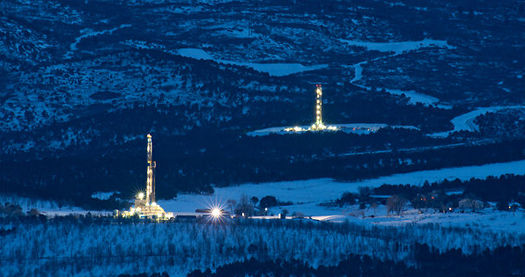
There's a danger, though, that the ghastly human and environmental damage of hydrofracking will weigh heaviest on poor countries with less capacity to resist.
Sorry, Dr Schuepbach, but this process should not happen in anyone's back yard.


Comments [7]
Well, it is interesting to learn that France also faces this same issue. I hope that France will be successful in limiting the practice.
However, I do not think that poor countries will be the only ones to suffer. Even in the U.S. we have little or no capacity to resist. The powerful corporations who promote this practice have the law on their side, and there is little concerned citizens can do to fight them. For example, frackers are not even required to divulge what chemicals they are pumping into the ground.
04.18.11
03:33
Yes, we are fighting this as best we can in Pennsylvania. Rob's comment summarizes the situation well. The issue is growing in prominence in many states, and here and there we've seen policy victories, local governments taking a stand, etc. (Pittsburgh's city council passed a ban on fracking within the city limits -- thank you folks -- which has yet to be tested in court, but is still a noble gesture.)
There are a few folks here who are thinking this issue may be well suited for a new kind of journalism -- a combination of data gathering and visualization, professional investigative reporting, and aggregation of bottom-up everyman-powered reporting. The wells and drill sites are scattered, seldom on the beaten path, and subject to bursts and cycles of activity that can really only be captured by the people who live near them. Would be great to equip/empower them to report in to a collection where others help to make sense of what's going on. Otherwise, fracking, the companies involved, legal compliance and violations, and impact on environment and life are *very* difficult to assess.
Would love to see French and American people corresponding about their efforts to fight this looming disaster.
- Marc
04.20.11
01:25
04.21.11
02:43
I got involved in the issue about one month ago when I moved to the area, and found out about Fracking for the first time. As I have delved into the problem, one thing becomes apparent...it is happening all over America, and across the world as the money changers race once again after Black Gold, with our small rural communities and our environments being put in grave peril with our lands, water and health at risk of irreparable harm.
Looking at the problem, what I see, is a bunch of small local groups of concerned citizens and activists fighting an almost impossible battle...I believe this can only be changed if these small groups band together under one large Anti-Fracking organization. Just one organization created by and owned by the Natural Gas industry spent over 20 million dollars on TV Ads, made for TV movies (which they bought local air time for) and lobbying on both a state and federal level...we as small local groups cannot fight against that kind of clout and win.
Your article is well presented, and hope you will take a look at my blog which can be found at http://fracktoid.blogspot.com/
04.24.11
08:48
Marc, You're so right: we have the tools - and potentially big numbers of willing people - to ensure these stories see the light of day.
Megan, Gasland is indeed effective - they are showing it at public meetings here in France with French dubbing.
Fracktoid, great that you're blogging so many developments. Personally I don't see it is a life-or-death issue to have a single anti-fracking organization - for the moment, I'm pinning my hopes on the wisdom of crowds......and their [our] capacity to make life uneconomically hard for the fracking industry.
I hope these responses don't sound *too* complacent. We have to be smart, we have to swarm - and we have to avoid burning out.
04.27.11
11:54
I don't know how useful this is, but I am aware of these sites in France:
Les sites :
Il n'y a pas de site national mais une quantité de sites des collectifs locaux , liste sur http://tux-pla.net/cca
Herault http://www.pasdegazdeschistes.rd-h.fr/
Liste d'information :https://groups.google.com/group/gazschistes?hl=fr&pli=1
Blog d'un journaliste :http://fabrice-nicolino.com/index.php
Site d'un journaliste impliqué des le début : http://schiste.owni.fr/
Dernier article sur le lobbying d'un député :
http://owni.fr/2011/05/06/un-lobbyiste-des-gaz-de-schiste-chez-les-deputes/
Petition nationale http://www.petitions24.net/gaz_de_schiste__non_merci
05.07.11
06:20
I read news today that French parliament has voted to ban fracking nationwide. That's amazing. Do you think it has a chance of going all the way through to becoming law?
05.12.11
09:12